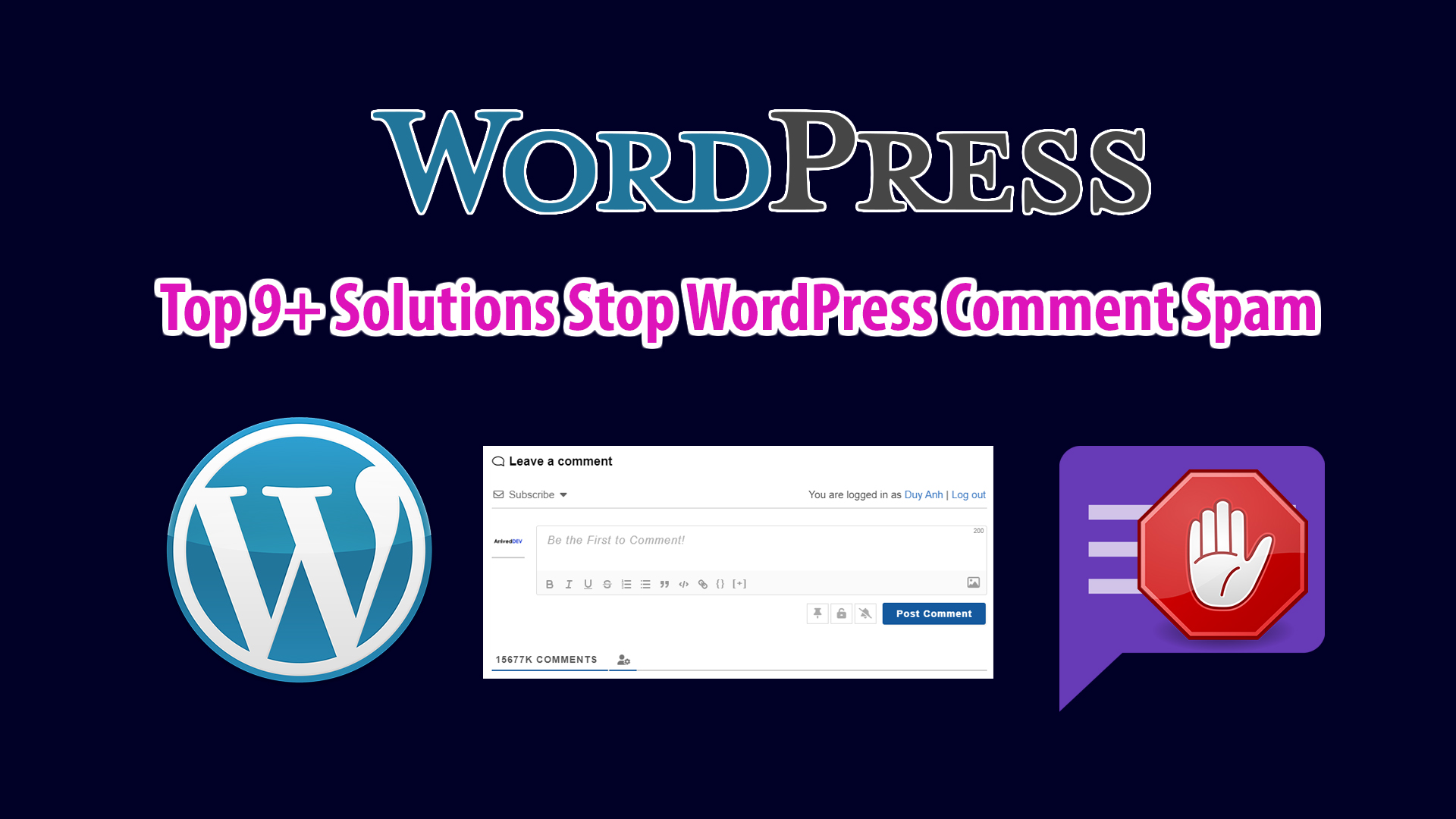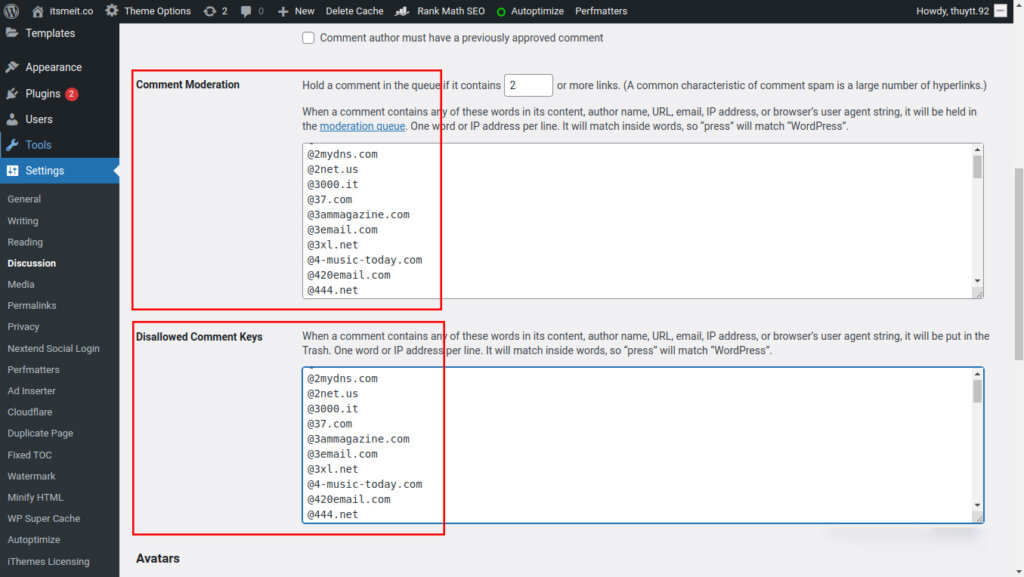Tackling WordPress comment spam is a crucial aspect of upholding quality user engagement with your site’s content. Spam comments can prove bothersome, diminishing the user experience and tarnishing your site’s reputation. Explore these 10 effective strategies to regulate comments and stop WordPress comment spam on your site.

1. Use a Plugin to Prevent Comment Spam on Your WordPress
WordPress offers numerous high-quality plugins designed to automatically detect and prevent comment spam on your website. Installing and activating one of these plugins provides a straightforward and efficient method to reduce spam. We also features a dedicated article about anti-spam plugins for WordPress that you can refer to.
2. Enable Captcha to Stop WordPress Spam Comments
Pros: Implement Captcha images or text tests to require users to verify that they’re not bots before submitting comments, effectively stop WordPress comment spam. WordPress anti-spam plugins, such as Google’s reCAPTCHA, can be easily integrated into your website.
Cons: We personally neither likes nor uses reCAPTCHA, as it can sometimes be challenging for users to authenticate the Captcha. Additionally, if not set up properly, it may slow down your website.
3. Removing All Links from WordPress Comment Content
To prevent users from adding links (URLs) in comments, which can deter spam bots from inserting malicious links that could potentially harm your website, you can incorporate the following code into your functions.php file to effectively stop WordPress spam comments.
add_filter( 'pre_comment_approved', 'prevent_spam_links_in_comments', 10, 2 );
function prevent_spam_links_in_comments( $approved, $commentdata ) {
// Allow admin to comment links
if ( current_user_can( 'manage_options' ) ) {
return $approved; // Allow if admin comment
}
$comment_content = $commentdata['comment_content'];
$site_url = get_site_url();
// Check if the content contains the string 'http://' or 'https://' then remove
if ( strpos( $comment_content, 'http://' ) !== false ||
strpos( $comment_content, 'https://' ) !== false ) {
preg_match_all( '/https?:\/\/[^\s<]+/i', $comment_content, $matches );
//Allow site url
if ( isset( $matches[0] ) && is_array( $matches[0] ) ) {
foreach ( $matches[0] as $link ) {
if ( strpos( $link, $site_url ) === 0 ) {
return $approved;
}
}
}
// If not in the domain of the website, delete the comment permanently
wp_delete_comment( $commentdata['comment_ID'], true );
wp_die( 'Please do not include any links in your comment!' );
}
return $approved;
}The provided code will grant default commenting privileges to the Admin and automatically remove all comments containing external links not originating from your own site. This approach effectively helps delete all comments containing external links, which is highly effective in stop WordPress comment spam and streamlining the comment approval process, ultimately saving you valuable time.
4. Check comment keywords to prevent spam
Utilize keyword lists to automatically detect comments with spam content, effectively helping to prevent WordPress comment spam. This approach is particularly beneficial since spam comments often contain irrelevant or promotional keywords, as well as sensitive terms. To implement this, navigate to “Settings -> Discussion” and add keywords to be blocked, as shown in the screenshot below.

5. Manual Comment Approval to Stop Spam Comments
Opt for the option to manually review comments before they appear on the website. While this method may require more time, it offers you complete content control before publication, effectively stop WordPress comment spam.

6. Customize Comment Settings
In WordPress settings, you have the option to customize how comments function. You can either disable comments altogether or restrict them to registered users only. This setting is also highly effective in preventing and stop WordPress comment spam generated by automated bots.
Requiring users to log in or register for an account before they can comment can significantly reduce spam, as these accounts often undergo more thorough vetting and management. You can leverage WordPress’ registration integration or additional plugins like Nextend Social Login to establish a login system.
7. Update WordPress and Plugin Versions
Ensure that you consistently keep up-to-date with the latest versions of WordPress and the plugins you use to effectively prevent comment spam on your WordPress site. Regular updates play a critical role in strengthening your website’s security and thwarting potential vulnerabilities that could be exploited by spam bots.
8. Use an external comment service to block spam
Consider using an external commenting service like Disqus or Facebook Comments, which can help block spam from WordPress. These services often include integrated anti-spam mechanisms, contributing to more efficient spam management.

9. Removing Website Field from WordPress Comment Form
Blocking spam from the WordPress comment form by removing the “Website” field not only enhances user experience but also helps to prevent and block spam from WordPress. Spammers often exploit this field to include site URLs intentionally within their comments. We has recognized the redundancy of this field, allowing you to eliminate it using the provided code snippet, which can be added to your functions.php file.
add_filter( 'comment_form_default_fields', function ($fields) {
unset( $fields['url'] );
return $fields;
});Efficiently stopping WordPress spam comments is a key element in maintaining a professional and positive website on the WordPress platform. By implementing one or more of the strategies mentioned above, you can effectively mitigate the impact of spam comments and cultivate a thriving and interactive online community for your users.









